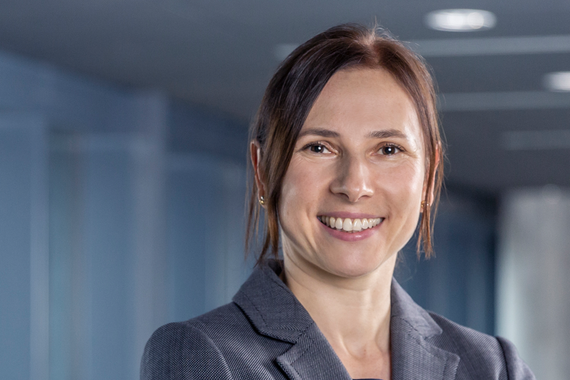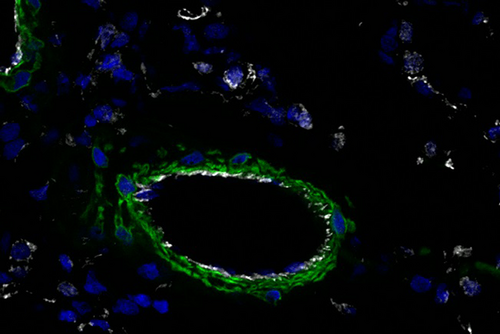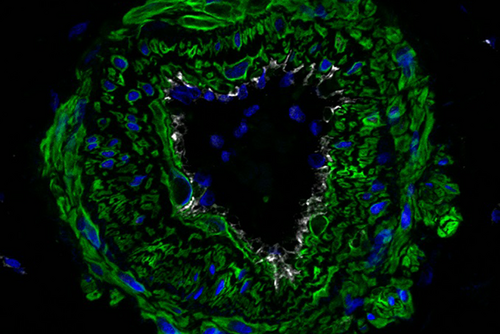-
The University
- Welcome
- Who we are
- Media & PR
- Studying
-
Research
- Profile
- Infrastructure
- Cooperations
- Services
-
Career
- Med Uni Graz as an Employer
- Educational Opportunities
- Work Environment
- Job openings
-
Diagnostics
- Patients
- Referring physicians
-
Health Topics
- Health Infrastructure
Research team Kwapiszewska
Research focus: Chronic respiratory and pulmonary diseases
PI: Grazyna Kwapiszewska
Focus: Pulmonary vascular remodelling has a multifactorial pathobiology characterized by changes in the endothelium, smooth muscle cells, and adventitia. These pathological changes lead to a remodeling of the pulmonary circulation and a massive alteration of the lumen in small- and medium-sized pulmonary arteries. Involvement of vascular component is present not only in pulmonary arterial hypertension (PAH) but also in chronic lung diseases such as chronic obstructive pulmonary disease (COPD) and lung fibrosis (PF), and when present deteriorates patients´ outcome, underscoring the importance of the vascular bed in these diseases. To date, the causes and consequences of endothelial and vascular involvement in specifically in different forms of lung fibrosis are poorly understood. The goal of this research group is to decipher the role pulmonary vasculature/endothelial cells in lung diseases, in terms of abnormal cellular interactions, hyperinflammation, vascular barrier disorders, and an altered basement membrane composition.
Networking: Grazyna Kwapiszewska is also Professor at the Institute for Lung Health, Giessen, Germany. The group works very closely with preclinical (Akos Heinemann – Division of Pharmacology, Dagmar Kolb – Core Facility Ultrastructure Analysis) and clinical departments (Gabor Kovacs, Nikolaus Kneidinger – Division of Respiratory Medicine, Jörg Lindenmann - Division of Thoracic and Hyperbaric Surgery). The international cooperations are marked by outstanding publications with the Universities such as Stanford, Harvard, Denver Colorado, Charite Berlin and Lund University.
Projects
Interaction of Inflammatory Cells and Basement Membrane Components in the Development of PH
- The extracellular matrix (ECM) has increasingly emerged as an active driver of disease progression. We have shown that basement membrane components are differentially regulated in various forms of pulmonary vascular diseases. In this project, we will investigate how the disruption of basement membrane homeostasis influences immune cells and thereby causes or exacerbates pulmonary diseases. Our goal is also to study how active ECM-derived fragments, known as matrikines, further drive vascular dysfunction and lung diseases.
- Duration: 2021 - 2025
- Funded by: Land Steiermark / FWF DOC 129, RespImmun
- Project partners: Liliana Schaefer (Johann Wolfgang Goethe University Frankfurt am Main, Germany), Karin Tran Lundmark (Lund University, Sweden), Malgorzata Wygrecka (Universities of Giessen and Marburg Lung Center, Germany), Dagmar Kolb (Gottfried Schatz Research Center, Medical University of Graz)
Endothelial cells in interstitial lung diseases
- Cellular heterogeneity, with its functional specialization and coordination, are key determinants for normal vascular and parenchymal lung function. We have already reported that endothelial cells alter their barrier function and activation properties during development of pulmonary fibrosis. We would like to further investigate how and which factors originating from endothelial cells can influence lung diseases.
- Duration: 2019- 2026
- Funded by: Medical University of Graz
- Project partners: Martin Kolb (McMaster University, Canada), Jonas Schupp (Hannover Medical School, Germany), Marek Bartkuhn (Justus Liebig University Giessen, Germany)
Cathepsin C inhibition in pulmonary hypertension
- The role of the immune system in the development of pulmonary arterial hypertension (PAH) is currently being investigated. Research has shown that certain immune cells release enzymes that can damage tissue and cause persistent inflammation in the lungs. In our studies, we have found that a protein called cathepsin C (CtsC), which activates these potentially damaging enzymes, is elevated in the lung tissue and blood vessels of PAH patients. The aim of this study is to understand how CtsC contributes to the development of PAH and whether blocking its activity could open up a new way to treat this disease.
- Duration: 2025 - 2028
- Funded by: FWF PAT5277424
- Project partners: Malgorzata Wygrecka (Justus Liebig University Giessen, Germany) Brice Korkmaz (INSERM, France), Marcin Sienczyk (Wroclaw University of Technology, Poland), Marko Novinec (University of Ljubljana, Slovenia)





